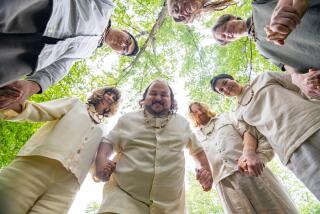Working Up a Smile : He’s Not Joking About Taking It Easier on the Job
You already know the definition of a computer: a CPA with personality.
I know a lot of people don’t like country and western music, but you’ve got to admit that it’s opened a whole new art form for people who can’t sing.
Clearly, this was a tough crowd.
Phil Miller, self-described political “gofer” by day and occasional comedian by night, was trying to show these folks how to use, as the title of the one-night course put it, “humor at work.”
The 10 men and women had paid $19 each for the three-hour workshop at Orange Coast College (“You’re getting a bargain, at Irvine they charge $25 for this”), but they were not exactly lighting up the night sky with side-splitting jokes.
Neither, for that matter, was Miller.
He explained that comedians figure that unless a crowd of strangers numbers two dozen or more, it’s going to be tough to get laughs. People are reticent in a small crowd and keep their guffaws to themselves. At any rate, before the workshop Miller warned that this was not going to be a copy of one of his appearances at the Comedy Club.
The purpose of the evening was to get people “to lighten up at work and enjoy themselves more and not be so serious about things,” he said. “It’s not on how to tell a joke. It’s on how to look at things with a little bit lighter perspective.”
Still, there were some high expectations.
“Are you the instructor?” a man wandering into the classroom asked Miller.
“Yes.”
“So you’re going to keep us laughing all night?”
Another man hesitated at the threshold of the class. “Alcoholics Anonymous?” Miller asked him with a sweet smile on his face.
“No,” the startled man said.
“Just kidding,” Miller replied.
“Will you be funny?” the student asked, stepping into the room without waiting for a reply.
Miller, 57, did not seem at first glance to be the likeliest teacher for this sort of class. After all, he served in the Korean and Vietnam wars with the Marine Corps, which started him off as a private in 1948 and discharged him as a captain in 1970.
But the Marines gave him two assignments that eventually led him to civilian classrooms.
The first was providing security for the U.S. Embassy in Libya from 1961 to 1965, in the days when King Idris ran the country and no one had heard of Moammar Kadafi. “I was a strict spit-and-polish, ramrod Marine,” he recalled. “Working with the State Department,” which runs American embassies, “I found that some of the things that work in military life don’t work with civilians. I learned to smile a lot more and not take things too damn seriously. Even when they are serious, you don’t have to take them too seriously.”
The second was being sent off for journalism training near the end of his career. After leaving the Marines, he worked in journalism, public relations and then on political campaigns. As he coached clients on how to meet people and put their ideas across, he wound up helping to teach public speaking courses, and stressing the need for humor.
Laurel Stone, secretary to the president of a construction company, attended a previous session on humor taught by another instructor and came away dissatisfied.
“The other course wasn’t what I had hoped,” she said. “It was mostly on the nature of, ‘Read the Readers Digest and you’ll always come up with jokes.’ ”
Stone said she was hoping to come up with suggestions on how to “defuse” a sometimes “volatile” boss. As the night wore on, she pressed Miller more and more for tips on how to defrost icy colleagues and turn the rude behavior of fellow workers back on them like a boomerang.
Miller went around the room, asking others to give their first names and explain why they were there.
Joan: “I work in the area of child abuse, and I think we have to lighten up sometimes.” No argument there.
Mike: “I’m Mike and I’m kind of serious. I smile and laugh, but. . . .”
Nina: “I’m a medical student and I tend to be too serious.”
Kerry: “I’m in investment banking. It tends to be serious.”
Terry: “I feel like I’m too serious sometimes, and when I try to be funny other people don’t laugh when I do.”
Miller explained that shyness is a major reason people don’t snap off witty repartee, even if they think that what they have to say is funny.
Shy people “think everybody in the world watches what they do.” They won’t say something unless they’re sure it’s right.
“The way to get over being shy is just to do it, just do it,” he said. “Not worry about what other people think. When you first start trying to inject humor into things, you may be a little bit reluctant to jump in with two feet and say something that you think is funny because you can rationalize yourself into reasons why you shouldn’t possibly say that.”
Then it was time for the first “exercise” of the night.
Miller got everyone on their feet and told them to cross their arms over their chests.
Borrowing from “right brain-left brain” literature, Miller gave a pop personality rundown of the class, based on which arm was on top. He said later that the main purpose of the exercise was to loosen people up. It worked. Someone actually joked.
People with left arms on top are linear thinkers, logical, and should be accountants or computer programmers, Miller said. “People with their left arms up should be attorneys. People with their left arms up should be burglars.”
“Same thing, right?” said Kerry, herself an accountant with the investment banking firm.
That, in turn, gave Miller a chance to demonstrate what he later told the class was a cardinal principle of comedy: Tell jokes in threes. Three “how cold was it?” jokes. Three mother-in-law jokes. In this case, three lawyer jokes.
“We shouldn’t make fun of attorneys,” Miller said. “I mean, they are my favorite subspecies.”
Then: “If it weren’t for attorneys, we’d all go through life thinking life is as simple as it really is.”
Miller mixed in tidbits from pop psychology and pop science: Dr. Joyce Brothers says that a man meeting someone for the first time makes his initial judgment of the stranger in 30 seconds; a woman takes three seconds. A person’s eyes expand three times when he’s happy. You’re 85% more effective if you hold eye contact with the person you’re talking to.
Keep the jokes short, Miller urged. From his own experience, he told of giving workshops on other subjects with a USC professor who just never got the technique of telling a punchy joke.
To get the class warmed up, Miller went one by one, asking different questions of different students in the obvious hope that the student would parlay the question into a joke. For instance, “You’re at a friend’s house for dinner and you find a dead cockroach in your salad. What would you do?”
“I don’t think that’s funny,” the woman who was asked the question said, to loud laughter. No, really, what would you say? “What the hell’s this cockroach doing in my salad?”
During a break, Miller handed out samples of a periodical he subscribes to and which he suggested as a possible source of jokes. Afterward, he tried to get pupils to work one of the jokes they had read into a conversation.
Kerry got the idea.
As Miller asked about pet peeves, she mentioned that one of hers was motorcyclists sharing a lane with a car. Sounded reasonable. Then she reached into her memory for the joke she had picked up off the sheet: “I’m afraid when they do, I’m going to have to go to Pep Boys and get motorcycle remover for my car.”
See how you could weave that into a conversation at work?
As the night wore on, the class failed to warm up.
There was one brief spate of bachelor jokes before the students lapsed back into silence.
Q: “You know how a bachelor cleans up his house?”
A: “He calls his mother.” And: “He buys a new house.” And: “He moves and forfeits his security deposit.”
The rest was kind of tough, though, and toward the end of the evening, Miller began throwing out one-liners the students could use later and telling them that if they wanted to follow up they could search out the six books on humor and subscribe to the two periodicals filled with jokes that were on his recommended list.
Two days later, Miller said his students that night “were about what you usually get, people who don’t think in a funny way and don’t relax enough to think in a funny way.” He noted that he lost one student at the break. She went out the door and never came back, a common occurrence, he said.
Miller has been doing the humor class about a year. He also teaches workshops on conversational speaking and--the most popular one--on “where and how singles meet.”
His advice on that one: “There is no one single best place (to meet singles) except where you look the best. You shouldn’t go to places just because you heard there is a big group of single men or a big group of single women. You should go because you like it. . . . You won’t feel like you’re a piece of meat.”
He counsels that you look best when you are enjoying yourself. If you enjoy bowling, you’ll look good at the bowling alley. If you like tennis, you’ll look good on the tennis court.
Miller figures that he taught 46 night classes last year. He puts on workshops during the day, too, for Rotary clubs or management circles at large corporations. Those sessions wouldn’t be on how to meet singles, of course. But they would feature speaking skills and use of humor.
His basic rule: “Lighten up. For crying out loud, lighten up.”
For instance, in honor of the political year:
“They did a survey in the United States, and they found out that 75% of the people in the United States cannot name even one of the candidates. And, of course, the other 25% are the candidates.
And the all-purpose “template” joke in which you simply stick in someone’s name:
“Paul Simon looks like if you were in a French restaurant he’d be the guy that asked for a bottle of ketchup.”
“I don’t know about George Bush, whether he’d be a good president or not. He’s always reminded me of like, if you were having an orgy, Bush is the guy you would send out for the grapes.”


